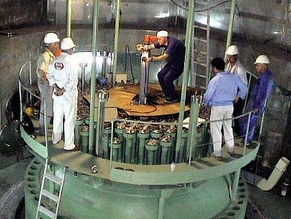|
World Jewish News

Iran's Bushehr nuclear power plant. Photo by: AP
|
France: Iran continues to be 'two-faced' on nuclear issue
07.03.2012, Israel and the World France's Foreign Minister said on Wednesday he was skeptical renewed talks between six world powers and Iran would succeed as Tehran was still not sincere in its willingness to negotiate over the future of its nuclear program. EU foreign policy chief Catherine Ashton, who represents the United States, Russia, China, France, Britain and Germany in dealings with Iran, said on Tuesday the six powers had accepted an Iranian offer for talks on its disputed nuclear program.
"I am a little skeptical ... I think Iran continues to be two-faced," French Foreign Minister Alain Juppe told France's i-Tele television.
"That's why I think we have to continue to be extremely firm on sanctions, which in my view are the best way to prevent a military option that would have unforeseeable consequences."
Iran's approach to the six powers, in a letter dated Feb. 14, comes as it suffers unprecedented economic pain from expanding sanctions against its oil and financial sectors.
Western states are likely to tread cautiously in talks, mindful of past accusations that Iran's willingness to negotiate has been a stalling tactic to blunt pressure rather than a genuine effort to reach agreement.
With increasing public speculation about possible military action against Iran, the talks could provide some respite in a crisis that has driven up oil prices and threatened to bring the United States into its third major war in a decade.
French President Nicolas Sarkozy was the first among leaders of the six powers to push for tighter sanctions on Iranian oil and finance, however Juppe on Wednesday signaled that France was wary of resorting to a military strike against Iran.
"There is still a debate in Israel (about a military strike) and it's our responsibility to bring to Israel's attention the unforeseeable consequences it would have," he said.
Sarkozy said in January that time was running out for efforts to avoid military intervention in Iran.
The Iranian parliament speaker on Wednesday expressed doubts about the outcome of the upcoming nuclear talks, the official news agency IRNA reported.
"If they (world powers) want to continue their previous course or get some advantages by threats, then the talks would have no achievements," Ali Larijani said.
The remarks by Larijani suggest that Iran would once again not accept the key demand by the world powers - the suspension of uranium enrichment.
"The world powers know well that Iran is not after nuclear weapons and even say that Iran has no such weapons but still they put pressure," said Larijani, who was Iran's chief nuclear negotiator from 2005 to 2007.
The speaker accused world powers of following a double standard by "saying nothing" to countries which are already thought to have atomic bombs and, unlike Iran, do not cooperate with the relevant nuclear organizations, such as Israel.
"If the powers insisted on this double standard policy, then they will gain nothing from the next talks," Larijani added.
Haaretz.com
|
|
